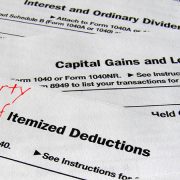Beware That Divorce Or Separation May Have An Effect On Your Taxes
Beware That Divorce Or Separation May Have An Effect On Your Taxes
Taxpayers should be aware of tax law changes related to alimony and separation payments. These payments are made after a divorce or separation. The Tax Cuts and Jobs Act changed the rules around them, which will affect certain taxpayers when they file their 2019 tax returns next year.
Old Law Still Applies To Agreements Executed On Or Before December 31, 2018.
Alimony paid to a spouse or a former spouse under a divorce or separation instrument (including a divorce decree, a separate maintenance decree, or a written separation agreement) may be alimony for federal tax purposes. Alimony is deductible by the payer spouse, and the recipient spouse must include it in income.
Alimony Requirements
A payment is alimony only if all the following requirements are met:
- The spouses don’t file a joint return with each other;
- The payment is in cash (including checks or money orders);
- The payment is to or for a spouse or a former spouse made under a divorce or separation instrument;
- The divorce or separation instrument doesn’t designate the payment as not alimony;
- The spouses aren’t members of the same household when the payment is made (This requirement applies only if the spouses are legally separated under a decree of divorce or of separate maintenance.);
- There’s no liability to make the payment (in cash or property) after the death of the recipient spouse; and
- The payment isn’t treated as child support or a property settlement.
Alimony doesn’t include:
- Child support,
- Noncash property settlements, whether in a lump-sum or installments,
- Payments that are your spouse’s part of community property income,
- Payments to keep up the payer’s property,
- Use of the payer’s property, or
- Voluntary payments (that is, payments not required by a divorce or separation instrument).
New Law Applies To Agreements Executed On Or After January 1, 2019 And Certain Pre-2019 Agreements modified after 2018.
The new law relates to payments under a divorce or separation agreement. This includes divorce decrees, separate maintenance decrees and written separation agreements.
Beginning January 1, 2019, alimony or separate maintenance payments are not deductible from the income of the payer spouse, or includable in the income of the receiving spouse, if made under a divorce or separation agreement executed after December 31, 2018.
If an agreement was executed on or before December 31, 2018 and then modified after that date, the new law also applies. The new law applies if the modification does these two things:
-
- It changes the terms of the alimony or separate maintenance payments.
- It specifically says that alimony or separate maintenance payments are not deductible by the payer spouse or includable in the income of the receiving spouse.
Agreements executed on or before December 31, 2018 follow the old law. If an agreement was modified after that date, the agreement still follows the previous law as long as the modifications don’t do what’s described above.
Other Rules That Apply Under Both The Old And New Law
Child support is never deductible and isn’t considered income. Additionally, if a divorce or separation instrument provides for alimony and child support, and the payer spouse pays less than the total required, the payments apply to child support first. Only the remaining amount is considered alimony.
Reporting Alimony
If you paid amounts that are considered alimony, you may deduct from income the amount of alimony you paid whether or not you itemize your deductions. Deduct alimony payments on Form 1040, U.S. Individual Income Tax Return and attach Form 1040 Schedule 1, Additional Income and Adjustments to Income. You must enter the social security number (SSN) or individual taxpayer identification number (ITIN) of the spouse or former spouse receiving the payments or your deduction may be disallowed and you may have to pay a $50 penalty.
If you received amounts that are considered alimony, you must include the amount of alimony you received as income. Report alimony received on Form 1040 Schedule 1 or on Form 1040NR Schedule NEC, U.S. Nonresident Alien Income Tax Return. You must provide your SSN or ITIN to the spouse or former spouse making the payments, otherwise you may have to pay a $50 penalty.
If you are involved in a divorce, you need to know where you would stand on taxes whether you are paying or receiving party and avoid any potential tax problems from past or future years. Tax problems are usually a serious matter and must be handled appropriately so it’s important to that you’ve hired the best lawyer for your particular situation. The tax attorneys at the Law Offices Of Jeffrey B. Kahn, P.C. located in Orange County (Irvine), San Diego County (Carlsbad) and elsewhere in California are highly skilled in handling tax matters and can effectively represent at all levels with the IRS and State Tax Agencies including criminal tax investigations and attempted prosecutions, undisclosed foreign bank accounts and other foreign assets, and unreported foreign income. And if you are involved in cannabis, check out what a cannabis tax attorney can do for you.











 Follow
Follow Follow
Follow